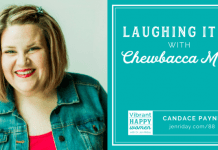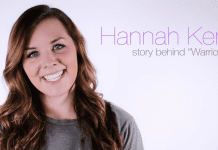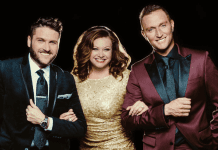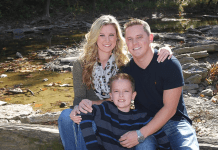by Kelinda Crawford
K: Jen, you have quite an amazing life story! Will you share with us a little about the circumstances surrounding your adoption?
J: I’ve always known that I was adopted; my parents were always very open about my being adopted, my Romanian parents, and even that I was probably given up for adoption because I didn’t have legs—but that it was meant to be and I was an answered prayer and their miracle. They told me not to be bitter toward my biological parents because regardless of WHY they gave me up—it didn’t matter—it worked out exactly how it was supposed to.
K: Growing up in a very small town in Illinois must have had its challenges. What was your childhood like?
J: Growing up in a small town was actually the exact childhood I needed. After the first day of kindergarten, everyone knew that I didn’t have legs and no one cared anymore. Kids are kids and they all play together on the playground and everyone’s kind of equal at that point. I graduated from high school with most of the kids I started kindergarten with. Thankfully bullying was not part of my childhood. I know I was shielded from that, and am thankful for my supportive peers, teachers, and coaches along with my family. I needed that childhood so I could grow and blossom into who I was meant to be today and handle all the things that I’m meant to do now.
K: Your parents, Gerald and Sharon Bricker, have obviously been a huge influence in your life. Share with us some of the ways in which have impacted your life and helped you to get where you are today.
J: My parents are great and so humble, which makes it even better and them even cooler! They’ve done so many things for me. One of the biggest, I would say, beyond continued and massive love, support and encouragement (and that’s everything), is that they gave me the confidence and freedom to have my own mind. To be confident in my own decisions, to trust myself and my judgement. They would always say, “you have a great head on your shoulders, I know without a doubt that whatever you put your mind to, you’ll do it!” And they meant it! They didn’t just SAY these things, they backed them up with actions. That’s powerful, because words without actions are empty.
K: Most people would consider being born without legs to be a handicap. But you don’t consider yourself to be handicapped—and your life certainly bears this out. You have, however, faced and overcome many challenges throughout your life. What do you consider to have been your greatest challenge…and how did you overcome it?
J: I would say my biggest challenge (as I mention in the book for the first time publically) has been overcoming body dismorphia, obsessing over being crazy thin, looking in the mirror and seeing a body that looks 10lbs heavier. I had to really take serious measures, covering up mirrors in my apartment, repeating scriptures and truths out loud every day, leaning on close friends in my life and being in prayer daily, making the choice to not let this overtake my mind and my life. It was a long road to get on the other side (over two years) but I know I went through it so that I could talk about it and hopefully help others who are going through the same thing.
K: What role has your faith played in your life story? Are there any particular scriptures or Bible passages that have impacted your life?
J: My faith has played an important role in my life from day one. It’s my rock, my foundation, my understanding of myself and my life. My understanding of my purposes and my destiny, my perspective of everything and my confidence is based and rooted in my faith in Jesus. One of my favorite scriptures is Mark 9:23—how the title of my book became what it is. That was one verse I felt that really summed up the way I view “taking on life,” my “motto’ if you will!
K: When you turned 16 and learned about your biological family, you got a huge surprise. Would you tell us about that moment and why the surprise was so meaningful to you as a gymnast?
J: My friend, who was also adopted, found out what her biological last name was and up until that point (I was almost 16) I had never really cared about meeting my biological family. But when my friend found out what her last name would have been, the idea was placed in my mind, “I wonder what MY last name would have been?” Given how open my parents were about my adoption, it’s amazing that I would even think there was something they knew about my biological family that they hadn’t told me, but that’s why I say the thought was PLACED in my head—it was meant to be. I asked my mom if she knew anything about my biological family and she said she did! What could she possibly knew about my bio family that I didn’t know? She told me my last name would have been Moceanu, and I knew exactly what that meant. That Dominique Moceanu was my full-blooded sister. I used to watch her as a kid and was always drawn to her, knew that we looked alike, we were both of Romanian descent, and I had felt a connection to her since I was about 7 years old! Crazy times!!
K: Your parents taught you that there are two words you should never say: Would you share them with us? Why do you feel it is so important for people to remove them from their vocabulary?
J: My parents always told me that “can’t is not part of your vocabulary.” The thing about that is that it was SO MUCH more than just SAYING it, they backed it up with actions. If I came to them and said, “I want to go play basketball, softball, volleyball, power tumbling, even roller skating, all with able-bodied athletes,” they didn’t say, “oh no Jen, that’s too hard, you’re too fragile, that’s too dangerous, etc.” They said, “Okay, let’s figure out how to make it work for you, you can do whatever you put your mind to.” It was a way of life, not just a saying. I think it’s important to eliminate that word—can’t—because you’re limiting yourself the moment you say it, you’re putting a ceiling right above your head and blocking your own happiness, success, whatever it is you desire because the minute you say it, you believe it. Words have power, we should be aware of what we’re speaking into our own lives and making sure it’s empowering, not negative.
K: At 28, you’re a professional aerialist and a motivational speaker. Where do you go from here, Jen? What does the future hold for Jen Bricker?
J: I have many dreams and goals, both personal and professional. I think I’ll probably have several more books about a ton of different subjects: health, fitness, love, dating, following your dreams and passions. And one day, parenting. I want to get married and have kids one day as well. I’ve really felt called to shake up the beauty industry in a big way. I think we’re ready to see a face and body we’ve never seen before representing brands like Covergirl, Under Armour, L’Oreal, on covers that have never seen a body like mine, SHAPE, SELF, Vanity Fair, Sports Illustrated, etc. The opportunity to do groundbreaking things in this industry absolutely exhilarates me, and knowing that millions of people can be inspired through these mediums, I think we’re ready for this as a society, I think we’re craving it. It’s time.
K: What do you hope people will learn from your story?
J: I hope people learn many things; everyone takes away what they need and it’s always different. But a big take away I’d love for people to know is that they are significant—we all have gifts, talents and abilities that we were born with, passions, desires, things we’ve loved since we were kids. The things that make us stand up and cheer our faces off and get our blood pumping and heart beating. We can all use those gifts and talents to change someone’s life, and that’s powerful! But what we each “bring to the table” is EQUALLY as powerful! People think about certain people’s lives and think, “Wow, they are so important, what they’re doing is so amazing! I can’t be like them, they’re just more important and what they do matters more, my life is boring and I’m not as important,”—WRONG! You can touch someone that I can’t and vice versa. We each have our gifts and they’re different, they’re supposed to be, but we should celebrate the diversity and uniqueness of our talents so that we can reach more people.
K: You have recently published an autobiography, Everything Is Possible. Where can people connect with you and purchase a copy of your book?
J: You can buy the book anywhere and everywhere books are available. Amazon, Barnes & Noble, JenBricker.com/book, airports, and there’s also an audio version read by me! You can follow me on IG, FB, Snap @JenBricker & Twitter @JenBricker1.

















